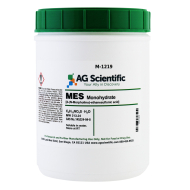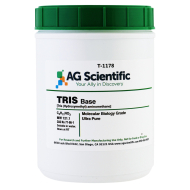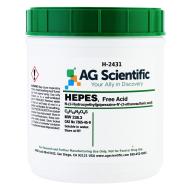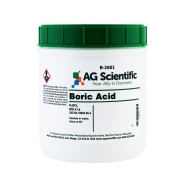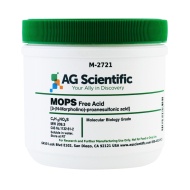Biological buffers usually consist of a conjugate base and a weak acid or a conjugate acid and weak base. A buffer is a type of solution that helps maintain stable pH levels. Successful research is dependent on finding and using the right buffer. The following are five important aspects to consider when choosing a biological buffer.

1. pKa Values
Since most biological reactions will occur between a pH level of 6 and 8 it's important to choose a buffer with the right pKa value. Before selecting a buffer it's necessary to figure out what pH level is right for the experiment.
If it is likely that the pH will decrease or increase during the experimental process it's important to choose a buffer with pKa that is either higher or lower than the optimum at the start of any experiment. Each buffer has a certain pH range in which it exhibits sufficient buffered power. A buffer should have a pKa value that is within one pH of the desired pH.
2. Water Solubility
The solubility of a buffer is extremely important. It's necessary that most buffers are highly soluble in water. It's also necessary that they are minimally soluble in most organic solvents. This is important because most biological systems will naturally use water as a solvent. The greater the water solubility of a buffer, the easier it is to prepare a concentrated stock solution. It's important to note that upon dilution, the pH of stock solutions may change.
3. Salt Effects
Salt can seriously affect the outcome of an experiment since most biological systems are easily affected by salts. Sciencing describes many of the attributes of a good buffer, including the necessity of minimal salt effects. Salts may create reactions that will cause complications and possibly affect the outcome of the research. However, salts are sometimes added during an experiment to make adjustments to improve the compound's buffer capacity.
4. Permeation
Permeation is a critical factor when choosing a biological buffer. A buffer should not pass through any of the cell membranes. If the buffer builds up within the cell it can actually alter the cell. This has the potential to change the outcome of the research. A good buffer will not build up accumulation in any cellular organelles.
5. Ionic Strength
Ionic strength is a factor that will need serious consideration. Biological systems may suffer serious complications with high ionic strength in a buffer. According to Bite Size Bio, ionic strength is an important aspect because the buffer should not have significant impact on ionic concentration in the experiment. It's important to consider all these factors when choosing the best biological buffer. It's also necessary to choose a company that can provide effective and high quality buffers. AG Scientific offers a variety of excellent biological buffers. The company started in 1997 and has a focus on drug development and clinical research. AG Scientific offers a wide variety of products and services with emphasis in several markets including fermentation, medical devices, nucleic acid purification and cancer research.
AG Scientific's Popular Biological Buffers
Product |
CAS# |
Bis-Tris |
6976-37-0 |
Calcium Carbonate |
471-34-1 |
EGTA |
67-42-5 |
Glycine |
56-40-6 |
HEPES |
7365-45-9 |
MES |
145224-94-8 |
MOPS |
1132-61-2 |
PIPES |
10010-67-0 |
Sodium Formate |
141-53-7 |
Tris HCl |
77-86-1 |
